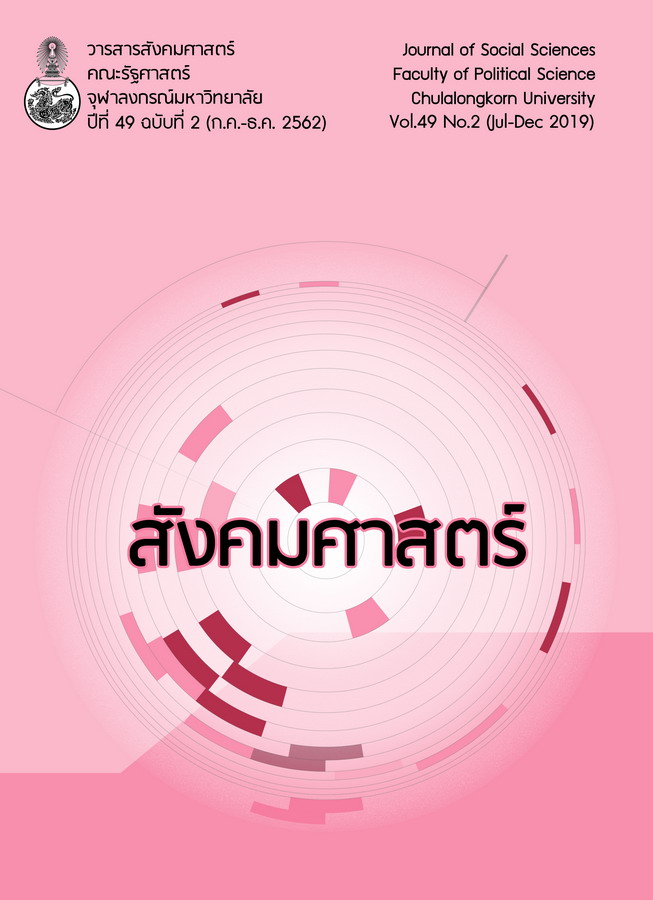ไฟฟ้าพลังงานน้ำ และพลวัตรความสัมพันธ์อินเดีย-ภูฏาน
DOI:
https://doi.org/10.61462/cujss.v49i2.732คำสำคัญ:
ภูฏาน, ไฟฟ้าพลังงานน้ำ, นโยบายต่างประเทศอินเดีย, ความสัมพันธ์อินเดีย-ภูฏานบทคัดย่อ
การศึกษานี้มุ่งเน้นศึกษาความสัมพันธ์ระหว่างอินเดียและภูฏานภายหลังทบทวนสนธิสัญญาพันธมิตรในปี 2550 ผ่านระเบียบวิธีวิจัยแบบคุณภาพ การลงทุนในไฟฟ้าพลังงานน้ำของอินเดียถือเป็นกุญแจสำคัญในภาคส่วนเศรษฐกิจที่ส่งเสริมและรักษาความสัมพันธ์ที่ดีระหว่างอินเดียและภูฏาน การลงทุนนี้ยังช่วยให้อินเดียมีความมั่นคงทางด้านพลังงานเพิ่มขึ้นและส่งผลให้ภูฏานพึ่งพิงเศรษฐกิจและการลงทุนจากอินเดีย ฉะนั้นการพัฒนาไฟฟ้าพลังงานน้ำในภูฏานจึงไม่ใช่เพียงนโยบายเศรษฐกิจของอินเดียหากเป็นนโยบายต่างประเทศที่มีต่อภูฏาน การศึกษาเน้นวิเคราะห์ความสัมพันธ์อินเดีย-ภูฏานผ่านโครงการไฟฟ้าพลังงานน้ำ ทั้งในเชิงนโยบายและการจัดโครงสร้างองค์การในฐานะปัจจัยเชื่อมโยงสำคัญที่สะท้อนให้เห็นถึงความสัมพันธ์ลักษณะพิเศษที่ภูฏานมีให้อินเดีย โดยอาศัยข้อมูลปฐมภูมิและทุติยภูมิในการศึกษา บทความชิ้นนี้ต้องการนำเสนอให้เห็นว่าโครงการไฟฟ้าพลังงานน้ำในภูฏานนั้นมีความสำคัญในฐานะสัญลักษณ์ซึ่งสะท้อนภาพความสัมพันธ์ลักษณะพิเศษที่อินเดียมีต่อภูฏาน ความเปลี่ยนแปลงที่เกิดขึ้นต่อแนวนโยบายการพัฒนาโครงการไฟฟ้าพลังงานน้ำในภูฏานจึงสะท้อนภาพความสัมพันธ์กับอินเดียที่เปลี่ยนแปลงไป
Downloads
เอกสารอ้างอิง
Alam, Firoz, Quamrul Alam, Suman Reza, S.M. Khurshid-ul-Alam, Khondkar Salequeb, and Harun Chowdhurya. 2017. “Sourcing Green Power in Bhutan: A Review.” Energy Procedia 110(March): 586-591.
Coelho, V. H. 1971. Sikkim and Bhutan. Delhi: Vikas.
Ebinger, Charles K. 2011. Energy and Security in South Asia Cooperation or Conflict? New Delhi: Cambridge University Press India.
Fraser, Neil, Anima Bhattacharya, and Bimalendu Bhattacharya. 2001. Geography of a Himalayan Kingdom: Bhutan. New Delhi: Concept.
Gupta, Bhabani Sen. 1999. Bhutan towards a Grass-Root Participatory Polity. New Delhi: Konark Publishers PVT LTD.
International Hydropower Association. 2017. “Bhutan.” Accessed July 24, 2018. https://www.hydropower.org/country-profiles/bhutan.
Jain, Gaurav, and Vinay Kumar Saini. 2016. Impact of Cross-Border Electricity Trade on Bhutan (Country Series): Working Paper. New Delhi: Integrated Research and Action for Development. Accessed February 25, 2018. https://sari-energy.org/publications-list/6126.
Kathuria, Anil. 2007. Encyclopaedia of Nepal, Bhutan and Tibet: Volume 2 Bhutan. New Delhi: Anmol Publications.
Kennedy, Andrew B. 2015. Nehru’s Foreign Policy: Realism and Idealism Conjoined. In The Oxford Handbook of Indian Foreign Policy, edited by David M. Malone, C. Raja Mohan and Srinath Raghava, 126-140. Oxford: Oxford University Press.
Kharat, Rajesh S., ed. 2016. Bhutan: Contemporary Issues and Perspectives. New Delhi: Adroit Publishers.
-----. 2005. Foreign Policy of Bhutan. New Delhi: Manak Publications.
-----. 2009. “Indo-Bhutan Relations: Strategic Perspectives.” In Himalayan Frontiers of India Historical, Geo-politics and Strategic Perspectives, edited by K. Warikoo, 137-166. New York: Routledge.
-----. 2015. “The Significance of SAARC for Bhutan.” India International Centre Quarterly 41(3): 86-98. Kinga, Sonam, Karma Galay, Phuntsho Rapten, and Adam Pain. 1999. Gross National Happiness Discussion Papers. Thimphu: The Centre for Bhutan Studies.
Mahajan, S. 2015. The Foreign Policy of the Raj and Its Legacy. In The Oxford Handbook of Indian Foreign Policy, edited by D. M. Malone, C. R. Mohan and S. Raghava, 78-94. Oxford: Oxford University Press.
Malone, David M., C. Raja Mohan, and Srinath Raghavan. 2015. The Oxford Handbook of Indian Foreign Policy. Oxford: Oxford University Press.
Mehra, G. N. 1981. Bhutan Land of the Peaceful Dragon. New Delhi: Vikas Publishing House PVT LTD.
Ministry of External Affairs, Government of India. 2012. India – Bhutan Relations. Accessed November 1, 2018, from Ministry of External Affairs, Government of India: https://mea.gov.in/Portal/ForeignRelation/Bhutan-February-2012.pdf
Mitra, Sabyyasachi, and Hoe Yun Jeong. 2017. Bhutan New Pathways to Growth. New Delhi: Oxford University Press.
Mohapatra, Anil Kumar. 2008. Small States in South Asia: A Security Perspective of the Himalayan States. Orissa: Panchashila.
National Legislative Bodies / National Authorities. 1949. “Treaty of Friendship between India and Bhutan.” Accessed July 24, 2018. http://www.refworld.org/docid/3ae6b4d620. html.
Phuntsho, Karma. 2016. The History of Bhutan. Haryana: Random House Publishers India Private Limited.
Premkumar, Lakshmi. 2016. A Study of the India-Bhutan Energy Cooperation Agreements and the Implementation of Hydropower Projects in Bhutan. New Delhi: Vasudha Foundation.
Rajput, Madhu. 2011. Indo-Bhutan Relations through Prism of History. New Delhi: Manak Publication.
Rathore, Laxman Singh. 1974. The Changing Bhutan. New Delhi: Jain Brothers.
Roy, S. 2018. “China Minister Arrives in Bhutan on First Top-Level Visit after Doklam.” Accessed July 24, 2018. https://indianexpress.com/article/india/china-minister-arrives-in-bhutan-on-first-top-level-visit-after-doklam-5272450.
Royal Bhutanese Embassy, New Delhi. 2016. “Bhutan-India Hydropower Relations.” Accessed July 24, 2018. http://www.mfa.gov.bt/rbedelhi/?page_id=28.
Singh, Mithilesh Kumar. 2014. Increasing Diplomatic Relations between Bhutan and China a Great Concern for India. New Delhi: Prashant Publishing House.
Staniland, P., and V. Narang. 2015. State and Politics. In The Oxford Handbook of Indian Foreign Policy, edited by D. M. Malone, C. R. Mohan and S. Raghava, 259-275. Oxford: Oxford University Press.
Stobdan, P. 2017. “India's Real Problem Lies in its Bhutan Policy, Not the Border.” Accessed July 24, 2018. https://thewire.in/diplomacy/india-china-doklam-real-problem-bhutan.
The Permanent Mission of the Kingdom of Bhutan to the United Nations. 2017. “Bhutan and the UN.” Accessed July 24, 2018. http://www.mfa.gov.bt/pmbny/?page_id=174.
Walcott, Susan M. 2011. “One of a Kind: Bhutan and the Modernity Challenge.” National Identities 13(3): 253-265.
ดาวน์โหลด
เผยแพร่แล้ว
รูปแบบการอ้างอิง
ฉบับ
ประเภทบทความ
สัญญาอนุญาต
ลิขสิทธิ์ (c) 2019 คณะรัฐศาสตร์ จุฬาลงกรณ์มหาวิทยาลัย

อนุญาตภายใต้เงื่อนไข Creative Commons Attribution-NonCommercial-NoDerivatives 4.0 International License.
เงื่อนไขการอนุญาตสาธารณะ
นโยบายลิขสิทธิ์และการอนุญาต
วารสารสังคมศาสตร์ จุฬาลงกรณ์มหาวิทยาลัย เผยแพร่เนื้อหาทั้งหมดภายใต้ สัญญาอนุญาตครีเอทีฟคอมมอนส์แบบแสดงที่มา-ไม่ใช้เพื่อการค้า-ไม่ดัดแปลง 4.0 นานาชาติ (CC BY-NC-ND 4.0)
ลิขสิทธิ์
บทความทั้งหมดที่ตีพิมพ์ในวารสารสังคมศาสตร์ จุฬาลงกรณ์มหาวิทยาลัย เป็นลิขสิทธิ์ของ คณะรัฐศาสตร์ จุฬาลงกรณ์มหาวิทยาลัย ผู้เขียนจะโอนสิทธิ์ทั้งหมดให้แก่วารสารเมื่อบทความได้รับการตอบรับให้ตีพิมพ์
สัญญาอนุญาต CC BY-NC-ND 4.0
ภายใต้สัญญาอนุญาตนี้:
-
แสดงที่มา (BY): ผู้ใช้ต้องแสดงที่มาโดยอ้างอิงถึงผู้เขียน คณะรัฐศาสตร์ จุฬาลงกรณ์มหาวิทยาลัย และวารสารสังคมศาสตร์ จุฬาลงกรณ์มหาวิทยาลัย พร้อมทั้งให้ลิงก์ไปยังสัญญาอนุญาต และระบุหากมีการเปลี่ยนแปลง ทั้งนี้สามารถทำได้ในลักษณะที่สมเหตุสมผล แต่ต้องไม่ทำในลักษณะที่แสดงว่าผู้อนุญาตให้การรับรองผู้ใช้หรือการใช้งานดังกล่าว
-
ไม่ใช้เพื่อการค้า (NC): ผู้ใช้ไม่สามารถใช้เนื้อหาเพื่อวัตถุประสงค์ทางการค้า การใช้งานเชิงพาณิชย์จะต้องได้รับอนุญาตเป็นลายลักษณ์อักษรล่วงหน้าจากผู้เขียนและคณะรัฐศาสตร์ จุฬาลงกรณ์มหาวิทยาลัย
-
ไม่ดัดแปลง (ND): หากผู้ใช้นำเนื้อหาไปรวม ดัดแปลง หรือต่อยอด ผู้ใช้ไม่สามารถเผยแพร่งานที่ดัดแปลงนั้นได้ การดัดแปลงผลงานจะต้องได้รับอนุญาตเป็นลายลักษณ์อักษรล่วงหน้าจากผู้เขียนและคณะรัฐศาสตร์ จุฬาลงกรณ์มหาวิทยาลัย
นโยบายการเข้าถึงแบบเปิด
วารสารสังคมศาสตร์ จุฬาลงกรณ์มหาวิทยาลัย ให้การเข้าถึงเนื้อหาแบบเปิดโดยทันทีตามหลักการที่ว่าการทำให้งานวิจัยสามารถเข้าถึงได้อย่างเสรีแก่สาธารณะจะสนับสนุนการแลกเปลี่ยนความรู้ในระดับโลก ผู้ใช้สามารถอ่าน ดาวน์โหลด คัดลอก เผยแพร่ พิมพ์ ค้นหา หรือเชื่อมโยงไปยังเนื้อหาฉบับเต็มของบทความได้โดยไม่ต้องขออนุญาตล่วงหน้าจากผู้จัดพิมพ์หรือผู้เขียน ทั้งนี้เป็นไปตามสัญญาอนุญาต CC BY-NC-ND 4.0
นโยบายการเก็บบันทึกด้วยตนเอง
ผู้เขียนสามารถเก็บบันทึกบทความฉบับตีพิมพ์สุดท้าย ต้นฉบับที่ส่ง (preprint) หรือฉบับที่ผ่านการประเมิน (postprint) ในคลังสถาบันหรือเว็บไซต์ส่วนตัวได้ โดยต้องมีการอ้างอิงการตีพิมพ์ครั้งแรกในวารสารสังคมศาสตร์ จุฬาลงกรณ์มหาวิทยาลัย พร้อมระบุแหล่งอ้างอิงที่สมบูรณ์และลิงก์ไปยังเว็บไซต์ของวารสาร
การขออนุญาต
สำหรับการใช้งานนอกเหนือจากที่ครอบคลุมโดยสัญญาอนุญาต CC BY-NC-ND 4.0 กรุณาติดต่อ:
กองบรรณาธิการ
วารสารสังคมศาสตร์ จุฬาลงกรณ์มหาวิทยาลัย
คณะรัฐศาสตร์ จุฬาลงกรณ์มหาวิทยาลัย
Email: cusocscij@gmail.com
สำหรับข้อมูลเพิ่มเติมเกี่ยวกับสัญญาอนุญาตครีเอทีฟคอมมอนส์แบบแสดงที่มา-ไม่ใช้เพื่อการค้า-ไม่ดัดแปลง 4.0 นานาชาติ กรุณาเยี่ยมชม: https://creativecommons.org/licenses/by-nc-nd/4.0/deed.th





